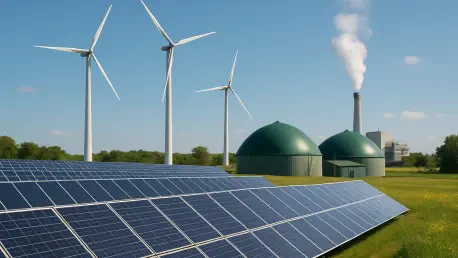The global energy landscape is undergoing a dramatic transformation as renewable energy sources, primarily solar and wind, become increasingly affordable and efficient for power generation. Recent reports by the United Nations and the International Renewable Energy Agency (IRENA) highlight a remarkable reduction in costs associated with renewables, making them more economically viable than traditional fossil fuels. Solar energy, for instance, is now 41% cheaper than fossil fuels, and wind energy has also seen significant declines in cost. This substantial shift signals a commitment to cleaner and more sustainable energy solutions, as countries worldwide embrace renewables to meet their growing energy demands.
Global Surge in Renewable Energy Capacity
Record-Breaking Expansion
The latest data reveals that worldwide renewable energy capacity reached 582 gigawatts last year, representing an impressive near 20% rise from the previous year. This growth marks the largest annual expansion since records began, highlighting the increasing global reliance on renewable sources such as wind and solar. Almost all new power capacity added globally is derived from renewables, solidifying a decisive trend toward environmentally friendly energy production. International Renewable Energy Agency findings underscore that over 90% of new renewable electricity produced is cheaper than the least costly fossil fuel alternatives. This economic advantage is driving widespread adoption, with nations continuing to prioritize clean energy options over polluting counterparts.
Renewables Dominate Electricity Generation
In a promising development for sustainability advocates, three-quarters of the increase in global electricity generation stem from renewable sources. This dominance illustrates the growing influence of renewables in the global energy mix compared to decreasing reliance on fossil fuels. As governments and industries invest in green technologies, these resources’ capacity and efficiency continue to improve. Correspondingly, many regions are witnessing reduced greenhouse gas emissions, benefiting the environment and mitigating climate change impacts. Renewable energy’s expanding role in electricity generation signals an enduring commitment to sustainable practices and actions to avert the worst environmental scenarios.
Navigating Challenges in the Renewable Energy Transition
Geopolitical and Economic Hurdles
Despite the optimistic outlook for renewable energy, several challenges persist that could hinder progress. Geopolitical tensions, trade tariffs, and supply chain disruptions pose significant threats to the widespread implementation and adoption of renewables. These issues can escalate costs or limit resource accessibility, slowing down the transition to a more sustainable energy system. UN Secretary-General António Guterres emphasizes the need for nations to work towards decoupling emissions from economic growth. While advanced economies witness emissions peaking alongside continued growth, developing countries strive to achieve similar results. Addressing these geopolitical and economic challenges is paramount for ensuring the smooth integration of renewable energy technologies into existing infrastructures.
Importance of International Cooperation
In light of present obstacles, calls for enhanced international cooperation and stable investment frameworks are becoming more pronounced. Key stakeholders like IRENA Director-General Francesco La Camera stress bridging cross-border divides through open supply chains and collaborative efforts. Encouraging investments in greener technologies could provide economic opportunities and foster energy independence for numerous countries. Additionally, government policies must support renewable energy adoption, phasing out fossil fuel subsidies, and accelerating these alternatives’ integration. A world committed to renewable energy signifies progress towards environmental conservation while showcasing the ability to transcend economy-based barriers for the collective good.
Shaping the Future of Energy Solutions
A Strategic Outlook
As global attention increasingly gravitates toward renewable energy, momentum builds for developing innovative energy technologies and solutions. These advancements pave the way for new industries, employment opportunities, and sustainable economic growth worldwide. Facing headwinds from volatile geopolitical climates, industry leaders continue advocating for forward-thinking strategies encompassing resilient supply chains and transparent investment frameworks. Organizations striving for energy independence can capitalize on such strategic foresight, propelling the transition to renewables. With robust support mechanisms, the environmental and economic benefits of renewable energy outweigh constraints, driving further innovation and evolution within the sector.
Capitalizing on Renewables’ Potential
The global energy sector is experiencing significant changes as renewable energy sources like solar and wind become more cost-effective and efficient for generating power. In recent reports from both the United Nations and the International Renewable Energy Agency (IRENA), there’s been notable progress in reducing the costs of renewables, making them more economically viable than fossil fuels. Solar energy now costs 41% less compared to fossil fuels, and wind energy has also seen substantial cost reductions. This shift demonstrates a global commitment to adopting cleaner and more sustainable energy solutions. Countries worldwide are increasingly turning to renewables not just to meet growing energy needs but also to address environmental concerns and reduce carbon footprints. As technology advances and investments increase, the transition to renewables is expected to accelerate, contributing to a more sustainable future with a positive impact on both economies and the environment, paving the way for a cleaner and greener world.









